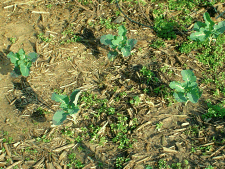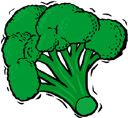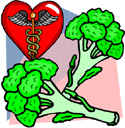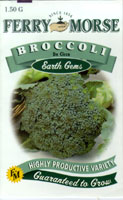
Broccoli is a vegetable.
botanical information:
Botanical name: Brassica oleracea italica (Italica Cultivar Group of species Brassica oleracea)
Common name: broccoli, brocks, calabrese, Italian asparagus, Italian broccoli
French name: brocoli
Use the botanical name when ordering seeds (bulbs, etc.) or when looking up information in the library. Common names vary by nation, culture, and region, and sometimes the same common name is applied to different plants.
Family: Brassicaceae (cabbage); formerly Cruciferae family
origin:
Origin: Mediterranean and Asia Minor; especially Italy.
history:
History: Broccoli was considered an valuable food in the Roman Empire (especially in the Italian penisula)
part used:
Part Used (for food): The flowering tops.
|
Part Used (broccoli sprouting seed): The raw seeds. Information courtesy of Mountain Rose Herbs |

Here comes Broccoli! courtesy of Green Earth Ministries (a Christian cannabis religion) |
nutritional information:
Eat broccoli at least three to five times a week. You may eat broccoli every day. For more information on healthy diet, see Goddess Diet Plan.
Broccoli is an alkaline-producing food (measured by the ash content resulting from laboratory titration.
Broccoli is a good source of proteins, carbohydrates, and lipids and is low in calories.
Broccoli is a source of protein.
Broccoli is a source of calcium, copper, and iron.
Raw broccoli has about twice as much Vitamin C as an equivalent amount of orange juice.
Raw broccoli has about three times as much calcium as an equivalent amount of mlik.
Broccoli helps keep the liver clean and healthy.
Broccoli is a source of sulforaphane, an antioxidant that detoxifies cancinogens. Doctors at John Hopkins University medical School identified broccoli as an exceptionally rich source of sulforaphane in 1992 and discovered in 1997 that broccoli sprouts have 20 times as much sulforaphane as the mature plant.
Eating cruciferous vegetables reduces the risk of bladder cancer by 29 to 41 percent and reduces the chance of breast cancer, lung cancer, and colorectal cancer.
nutritional value per 1 oz (28.35 gm.):
- Proteins: 800 mg
- Beta carotene: 177 IU
- Vitamin E: 220 mcg
- Vitamin C: 25.3 mg
- Phosphorus: 19 mg
- Magnesium: 6 mg
- Calcium: 13 mg
- Iron: 0.21 mg
- Potassium: 90 mg
See also Chinese herbalism below for Chinese gender and Chinese flavor.
selection:
Broccoli has the number eleven (11) lowest pesticide load of 45 common fruits and vegetables studied in 2006 by the Environmental Working Group and is therefore a food that can be purchased conventionally-grown when organic isn“t available. The EWA explains, “While washing and rinsing fresh produce may reduce levels of some pesticides, it does not eliminate them. Peeling also reduces exposures, but valuable nutrients often go down the drain with the peel. The best option is to eat a varied diet, wash all produce, and choose organic when possible to reduce exposure to potentially harmful chemicals.”
According to USDA and FDA tests on commercially grown foods collected between 2000 and 2005, broccoli has a 28.1% (percentage) of samples tested with detectable pesticides, a 3.2% (percentage) of samples with two or more pesticides, an 0.3 average number of pesticides found in a sample, an average of 0.004 parts per million of all pesticides found, and 19 different pesticides found in use growing broccoli. These toxic pesticides don’t apply to organic foods.
storage:
Storage: Eat broccoli within two days of purchase.



Chinese herbalism:
Chinese gender: yin (cool)
Chinese flavor: slightly pungent
next food
herbs |
||
| previous plant |
next plant |














